|
|
|
Sort Order |
|
|
|
Items / Page
|
|
|
|
|
|
|
| Srl | Item |
| 1 |
ID:
123195
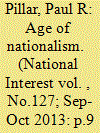

|
|
|
|
|
| Publication |
2013.
|
| Summary/Abstract |
THE URGE to apply era-defining labels to global affairs is strong and enduring. A label and a few easy-to-understand attributes associated with it can impart a reassuring simplicity to what is actually a complex and often-intractable reality. While the disadvantages of era labeling, including oversimplification, are probably as great as the advantages, the practice is here to stay.
|
|
|
|
|
|
|
|
|
|
|
|
|
|
|
|
| 2 |
ID:
117822
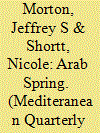

|
|
|
|
|
| Publication |
2012.
|
| Summary/Abstract |
The popular uprising that started in Tunisia in December 2010 quickly spread across the Arab world, culminating in a historic regional realignment with far-reaching implications. This essay details the implications of the Arab Spring for Israeli security. After highlighting the history of Israel's defense strategy and reviewing the Arab Spring revolts, the authors find that the recent uprisings exacerbate several issues faced by Israel, including geopolitical relations with other countries in the region, energy issues, and growing threats presented by nonstate actors.
|
|
|
|
|
|
|
|
|
|
|
|
|
|
|
|
| 3 |
ID:
087994
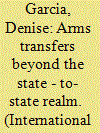

|
|
|
|
|
| Publication |
2009.
|
| Summary/Abstract |
Arms transfers beyond the state-to-state realm can have harmful effects for international security dramatically affecting the relations and behavior of states. This article examines why an emerging international norm on "prohibiting states to transfer arms to nonstate groups" has failed to diffuse at the international level. It discusses the already available international law framework existing at the regional and international levels upon which the potential norm could be built. The failure of the norm to diffuse at the international level can be primarily explained by the existence of a long-consolidated norm: the customary practice of states to transfer weapons to nonstate actors, that is, groups they deem legitimate to, without any interference or constraint.1 The unrestrained transfer of weapons is an established foreign-policy practice. It is the way states form, uphold alliances, extend friendships, and build spheres of influence (Sorokin 1994). Clearly, no state willingly wants to give this up. Therefore, the multilateral agreement on a norm barring most or all transfers of weapons to nonstate actors would curtail the freedom of action to build spheres of influence as states please. There are genuine ethical and moral dilemmas in this discussion, a nonstate actor may be a freedom fighter or a terrorist depending on different perspectives. The distinction between the categories "state" and "nonstate" actors may risk classifying actors in two camps: the good and the bad, respectively. This is problematic as a few states are known to be the most brutal perpetrators of egregious violations against their own citizens, whereas certain nonstate actors are legitimately fighting for the protection of vulnerable populations.
|
|
|
|
|
|
|
|
|
|
|
|
|
|
|
|
| 4 |
ID:
123623


|
|
|
|
|
| Publication |
2013.
|
| Summary/Abstract |
Nonstate actors, such as international non-governmental organizations (INGOs) and multinational corporations (MNCs), have attained an increasingly prominent role in modern world affairs. While previous research has focused on these actors' respective interactions with states, little attention has been paid to their interactions with each other. In this paper, we examine the extent to which the decisions of private actors seeking to invest abroad are affected by the reputational costs of doing business in countries publicly targeted by human rights activists. We find that ''naming and shaming'' by human rights INGOs tends to reduce the amount of foreign direct investment received by developing states, providing evidence that INGO activities affect the behavior of MNCs. An additional implication of our findings is that shaming by INGOs can impose real costs on targeted states in the form of lost investment.
|
|
|
|
|
|
|
|
|
|
|
|
|
|
|
|
| 5 |
ID:
164641


|
|
|
|
|
| Summary/Abstract |
Public diplomacy (PD) lacks an agreed-upon definition and boundaries. The ambiguity surrounding the conceptualization of the term leads to confusion among scholars and practitioners and hinders the consolidation of PD as an academic field. This article surveys 160 articles and books on PD, categorizes diverse perspectives into a taxonomy, and explores the coherence of each. The taxonomy can be categorized into these perspectives: state-centric, neo-statist, nontraditional, society-centric, and accommodative. The article maps the boundaries of public diplomacy with much needed clear and coherent criteria and positions PD within the broader discipline of international relations.
|
|
|
|
|
|
|
|
|
|
|
|
|
|
|
|
| 6 |
ID:
186596
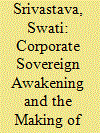

|
|
|
|
|
| Summary/Abstract |
The English East India Company's “company-state” lasted 274 years—longer than most states. This research note uses new archival evidence to study the Company as a catalyst in the development of modern state sovereignty. Drawing on the records of 16,740 managerial and shareholder meetings between 1678 and 1795, I find that as the Company grew through wars, its claim to sovereign authority shifted from a privilege delegated by Crown and Parliament to a self-possessed right. This “sovereign awakening” sparked a reckoning within the English state, which had thus far tolerated ambiguity in Company sovereignty based on the early modern shared international understanding of divisible, nonhierarchical layered sovereignty. But self-possessed nonstate sovereignty claimed from the core of the state became too much. State actors responded by anchoring sovereign authority along more hierarchical, indivisible foundations espoused by theorists centuries earlier. The new research makes two contributions. First, it introduces the conceptual dynamic of “war awakens sovereigns” (beyond making states) by entangling entities in peacemaking to defend sovereign claims. Second, it extends arguments about the European switch from layered sovereignty to hierarchical statist forms by situating the Company's sovereign evolution in this transformation. Ultimately, this study enables fuller historicization of both nonstate authority and the social construction of sovereignty in international politics.
|
|
|
|
|
|
|
|
|
|
|
|
|
|
|
|
| 7 |
ID:
083743
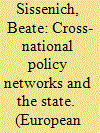

|
|
|
|
|
| Publication |
2008.
|
| Summary/Abstract |
This article challenges optimistic claims about the power of nonstate actors in cross-border policy networks. In a pilot study of two most-likely cases, the article examines the social policy network between the European Union and Poland and Hungary prior to accession. Two dimensions guide the analysis: Whether states act as gatekeepers and whether national borders restrict communications. The article shows that while labor and employers easily communicate with the EU, contacts fail to cut across national borders. Network data show that the EU significantly controls the flow of communication, a fact that runs counter to the notion of networks as fluid entities that enable all actors to link freely with others. Governments and the EU have an interest in network construction and control. Only by tracking network contacts empirically, the article argues, are we able to estimate the capacities and limits of nonstate actors in transnational politics.
|
|
|
|
|
|
|
|
|
|
|
|
|
|
|
|
| 8 |
ID:
166752
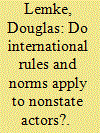

|
|
|
|
|
| Summary/Abstract |
The nonstate actors of interest in this article are territorial contenders: political entities that control populated territory, function like sovereign states but are not recognized as sovereign states by other members of the international system. Sometimes they are de facto states, sometimes they are rebel groups, sometimes they are neither of these, instead existing in control of territory with neither conflict against the sovereign state within whose borders they exist nor claims to a state of their own. New data about territorial contenders permit me to evaluate arguments about changing rules and norms in the international system. I find support for claims about the consequences of changing rules about which actors are recognized as sovereign states but not for claims about a norm against conquest after World War II. In the discussion section, I consider implications of these findings for future research.
|
|
|
|
|
|
|
|
|
|
|
|
|
|
|
|
| 9 |
ID:
186105


|
|
|
|
|
| Summary/Abstract |
This article provides empirical evidence of the emergence of new private governance forms through three case studies: transboundary air pollution, green supply chain, and energy transition in Northeast Asia. This article also refers to private governance theories discussed in the context of global environmental governance. Consistent with the private authority theory, entrepreneurs with vast expertise and capacity to provide useful information and practices have emerged. They allow stakeholders to cooperate in regional environmental sustainability under the conditions of weak or no focal institutions and heterogeneous state preferences. This observation is consistent with the global trend of environmental governance, which is shifting from regulatory-based to goal-setting governance. As global partnership theory suggests, hybrid forms of private governance, including various local- to global-level public–private partnerships, emerge across the cases. However, these forms of governance are still in the embryonic stage, where their functions of private authority are not fully developed. These insights challenge the predominant view on the limited roles of nonstate actors in building regional environmental governance in Northeast Asia as discussed in the existing literature.
|
|
|
|
|
|
|
|
|
|
|
|
|
|
|
|
| 10 |
ID:
073552


|
|
|
|
|
| Publication |
2006.
|
| Summary/Abstract |
Studies of global governance typically claim that the state has lost power to nonstate actors and that political authority is increasingly institutionalized in spheres not controlled by states. In this article, we challenge the core claims in the literature on global governance. Rather than focusing on the relative power of states and nonstate actors, we focus on the sociopolitical functions and processes of governance in their own right and seek to identify their rationality as practices of political rule. For this task, we use elements of the conception of power developed by Michel Foucault in his studies of "governmentality." In this perspective, the role of nonstate actors in shaping and carrying out global governance-functions is not an instance of transfer of power from the state to nonstate actors but rather an expression of a changing logic or rationality of government (defined as a type of power) by which civil society is redefined from a passive object of government to be acted upon into an entity that is both an object and a subject of government. The argument is illustrated by two case studies: the international campaign to ban landmines, and international population policy. The cases show that the self-association and political will-formation characteristic of civil society and nonstate actors do not stand in opposition to the political power of the state, but is a most central feature of how power, understood as government, operates in late modern society.
|
|
|
|
|
|
|
|
|
|
|
|
|
|
|
|
| 11 |
ID:
142210


|
|
|
|
|
| Summary/Abstract |
Interest groups partake in transnational negotiation conferences en masse. This is surprising given that the chances for influencing policymaking at these venues appear to be slim while the costs of participation are high. This amounts to an interesting question: why do so many interest groups attend transnational conferences? This article aims to answer this question by offering the first systematic study of the activities of interest groups at transnational conferences. It analyzes the goals, strategies, interactions, and influence of various types of interest groups at two transnational conferences; namely, the World Trade Organization Ministerial Conference (2011) and the Conference of the Parties of the UN Framework Convention on Climate Change (2012). The data was collected through 349 interviews with interest group representatives and 129 interviews with government delegates who participated in these conferences.
|
|
|
|
|
|
|
|
|
|
|
|
|
|
|
|
| 12 |
ID:
091000


|
|
|
|
|
| Publication |
2009.
|
| Summary/Abstract |
Theories of conflict emphasize dyadic interaction, yet existing empirical studies of civil war focus largely on state attributes and pay little attention to nonstate antagonists. We recast civil war in a dyadic perspective, and consider how nonstate actor attributes and their relationship to the state influence conflict dynamics. We argue that strong rebels, who pose a military challenge to the government, are likely to lead to short wars and concessions. Conflicts where rebels seem weak can become prolonged if rebels can operate in the periphery so as to defy a government victory yet are not strong enough to extract concessions. Conflicts should be shorter when potential insurgents can rely on alternative political means to violence. We examine these hypotheses in a dyadic analysis of civil war duration and outcomes, using new data on nonstate actors and conflict attributes, finding support for many of our conjectures.
|
|
|
|
|
|
|
|
|
|
|
|
|
|
|
|
| 13 |
ID:
165953
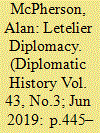

|
|
|
|
|
| Summary/Abstract |
On September 21, 1976, a bomb taped to the bottom of the car of Chilean exile and former ambassador and minister Orlando Letelier exploded as he drove into Sheridan Circle in Washington, DC. The Chilean died within minutes. Ronni Moffitt, Letelier’s co-worker and a U.S. citizen, sat in the passenger’s seat and also died. Letelier had been an outspoken opponent of Chilean dictator Augusto Pinochet, whose military junta had overthrown Marxist president Salvador Allende in 1973 and thrown Letelier, then Minister of Defense, in a prison camp for a year without charges. The investigation that followed pointed to the National Intelligence Directorate (DINA), the Chilean secret police, as the culprit, helped by an American-Chilean and a handful of Cuban-Americans; criminal and civil cases to bring the guilty to justice swallowed up the next few decades.
|
|
|
|
|
|
|
|
|
|
|
|
|
|
|
|
| 14 |
ID:
154925
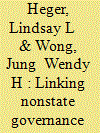

|
|
|
|
|
| Summary/Abstract |
Too often, our analyses of nonstate violent groups tend to black box the other aspects of what such groups do. Some groups choose to provide governance (in the form of goods of services) in addition to coordinating violence to achieve political goals. These different kinds of functions, whether violent or not, are all tied to the same underlying organizational structure. From this basic insight, we argue that groups that pursue both governance and violence will tend to have the following organizational structure: clear organizational agenda setting, command and control, and accountability mechanisms. This organizational structure will tend to produce a unique violence profile and allow for the provision of governance. In short, we point out the double-edged sword of organizational structure in terms of the outcomes that groups produce. Using several datasets, including the new Terrorist and Insurgent Organization Social Services dataset that accounts for the provision of social services, we show a preliminary association between violence and governance that demands future exploration. Thus, as a theory-building effort, our work demonstrates the importance of accounting for the diversity of activities that violent groups might pursue and offers evidence for how organizational structure shapes the possibility of pursuing different activities.
|
|
|
|
|
|
|
|
|
|
|
|
|
|
|
|
| 15 |
ID:
124386
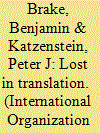

|
|
|
|
|
| Publication |
2013.
|
| Summary/Abstract |
In recent years U.S. legal norms and practices reconfigured important elements of how law is thought of and practiced in both common and civil law countries around the world. With specific focus on the spread of American procedural practices (class action and pretrial discovery), this article applies a transactional view of law that emphasizes the private practice of law and nonstate actors. Such an approach highlights important aspects of world politics overlooked by traditional analyses of international legalization, conventionally understood as the direct spread of law by and among states. We find that the movement of law is a dynamic process involving diffusion, translation, and the repeated transnational exchanges of legal actors. Through our examination of this process, we offer insights into how aspects of American law moved into unlikely jurisdictions to reshape legal theory, pedagogy, procedure, and the organizing structure of the legal profession.
|
|
|
|
|
|
|
|
|
|
|
|
|
|
|
|
| 16 |
ID:
088076


|
|
|
|
|
| Publication |
2009.
|
| Summary/Abstract |
During the past ten years there has been an increased willingness by international
health organizations to include multisectoral nonstate actors
in their decisionmaking processes. The stated aim of expanding multisectoral
involvement is to increase information flows from those on the ground,
to create a sense of policy ownership by those implementing various health programs,
to create a more unified front against global health priorities, and to
create a more robust sense of institutional legitimacy. One such institution has
been the Global Fund to Fight AIDS, Tuberculosis and Malaria, which was designed
specifically to bring various stakeholders together to create a more coordinated
mechanism to combat three of the world's most destructive diseases.
The purpose of this essay is to discuss the role of nonstate actors in the
decisionmaking processes of the Global Fund. The aim of this discussion is
not to undermine the good work of the Global Fund, but to expose certain
structural weaknesses in the current way nonstate actors are incorporated into
the governance process and to illustrate how these structural processes might
negate their effective participation. By doing so, this exploration will help expose
various deficit gaps between the stated aims of multisectoral participation
within the Global Fund and its actual practice. The goal is to encourage normative
recommendations for increasing the real-world operation of stakeholder
inclusiveness, ownership, partnership, and participation within the Global Fund.
|
|
|
|
|
|
|
|
|
|
|
|
|
|
|
|
| 17 |
ID:
158375


|
|
|
|
|
| Summary/Abstract |
International relations scholarship has made great progress on the study of compliance with international agreements. While persuasive, most of this work has focused on states’ de jure compliance decisions, largely excluding the de facto behavior of nonstate actors whose actions the agreement hopes to constrain. Of particular interest has been whether the OECD Anti-Bribery Convention (ABC) might reduce the propensity of multinational corporations (MNCs) to bribe officials in host countries through its mechanisms of extraterritoriality and extensive peer review. Unfortunately, research is hampered by reporting bias. Since the convention raises the probability of investors’ punishment for bribery in their home countries, it reduces both the incentives for bribery and willingness to admit to the activity. This generates uncertainty over which of these incentives drives any correlation between signing the convention and reductions in reported bribery. We address this problem by employing a specialized survey experiment that shields respondents and reduces reporting bias. We find that after the onset of Phase 3 in 2010, when the risk of noncompliance increased for firms subject to the OECD-ABC, those MNCs reduced their actual bribery relative to their nonsignatory competitors.
|
|
|
|
|
|
|
|
|
|
|
|
|
|
|
|
| 18 |
ID:
093819


|
|
|
|
|
| Publication |
2010.
|
| Summary/Abstract |
Studies of terrorism in general and suicide terrorism in particular tend to view terrorist groups independently. However, what if the propensity for a terrorist group to adopt suicide tactics depends in part on its external linkages and the relationship between the organizational capabilities required to adopt the innovation and the organizational capabilities of the group? This article shows that the organizational change requirements for adopting an innovation significantly influence the overall adoption pattern, along with interlinkages between groups. Additionally, evaluating the universe of terrorist groups, not only those groups that adopted suicide terrorism but those that did not, shows that Pape's key variable of interest, occupation, does not significantly predict the adoption of suicide terrorism. Thinking about suicide terrorism as a special case of diffusion in the military area-an innovation for nonstate groups-can help bring the study of suicide terrorism further into the mainstream and highlight how the phenomenon has not just differences, but similarities, to other innovations.
|
|
|
|
|
|
|
|
|
|
|
|
|
|
|
|
| 19 |
ID:
086434
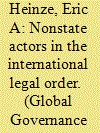

|
|
|
|
|
| Publication |
2009.
|
| Summary/Abstract |
The concern of whether nonstate actors can undertake an "armed attack" that would trigger a state's right to self-defense has acquired new prominence in the post-September 11 world. This article addresses that concern by examining the Israeli-Hezbollah conflict of July 2006. It argues that since the US invasion of Afghanistan in 2001, states have incurred an increased responsibility for the acts of nonstate actors that operate from their territory. Based on this emerging norm, the argument is that the degree of Lebanon's involvement in Hezbollah's attack against Israel was sufficient to justify the use of force in self-defense by Israel against both Hezbollah and the state of Lebanon. The conclusion is that while this is a potentially dangerous development in international law, there is reason to suggest that it may actually encourage states to prevent their territory from being used by nonstate actors to export violence.
|
|
|
|
|
|
|
|
|
|
|
|
|
|
|
|
| 20 |
ID:
112854


|
|
|
|
|
| Publication |
2012.
|
| Summary/Abstract |
The most prominent form of violent conflict in the world today occurs within states
rather than between them. Since 1945, over 75 percent of militarized disputes have
been civil conflicts.
1
From the African continent to the Balkans, civil wars have
raged and self-determination movements have mobilized for collective violence.
Conflict over identity has emerged as a central problem for nations and the internal
community as nationalist groups battle the state and each other in places like Iraq
and Sudan.
The comparative decline of conventional interstate war casts a spotlight on the
myriad of conflicts involving nonstate actors, be they in conflict with each other
or with existing states. We define a nonstate actor as an organized political actor not
directly connected to the state but pursing aims that affect vital state interests. The
dominant approach to analysis of conflicts involving nonstate actors views them,
like interstate conflicts, as the outcome of bargaining between antagonists (Fearon
1995; for review, see Walter 2009). This bargaining framework entails identifying
key players-typically just two-and specifying their preferences, the limits of their
capabilities and resolve, and the information they have about each other.
2
Given
such information, analysts derive predictions about when their strategic interaction
will result in conflict, as well as the characteristics of that conflict.
|
|
|
|
|
|
|
|
|
|
|
|
|
|
|
|
|
|
|
|
|